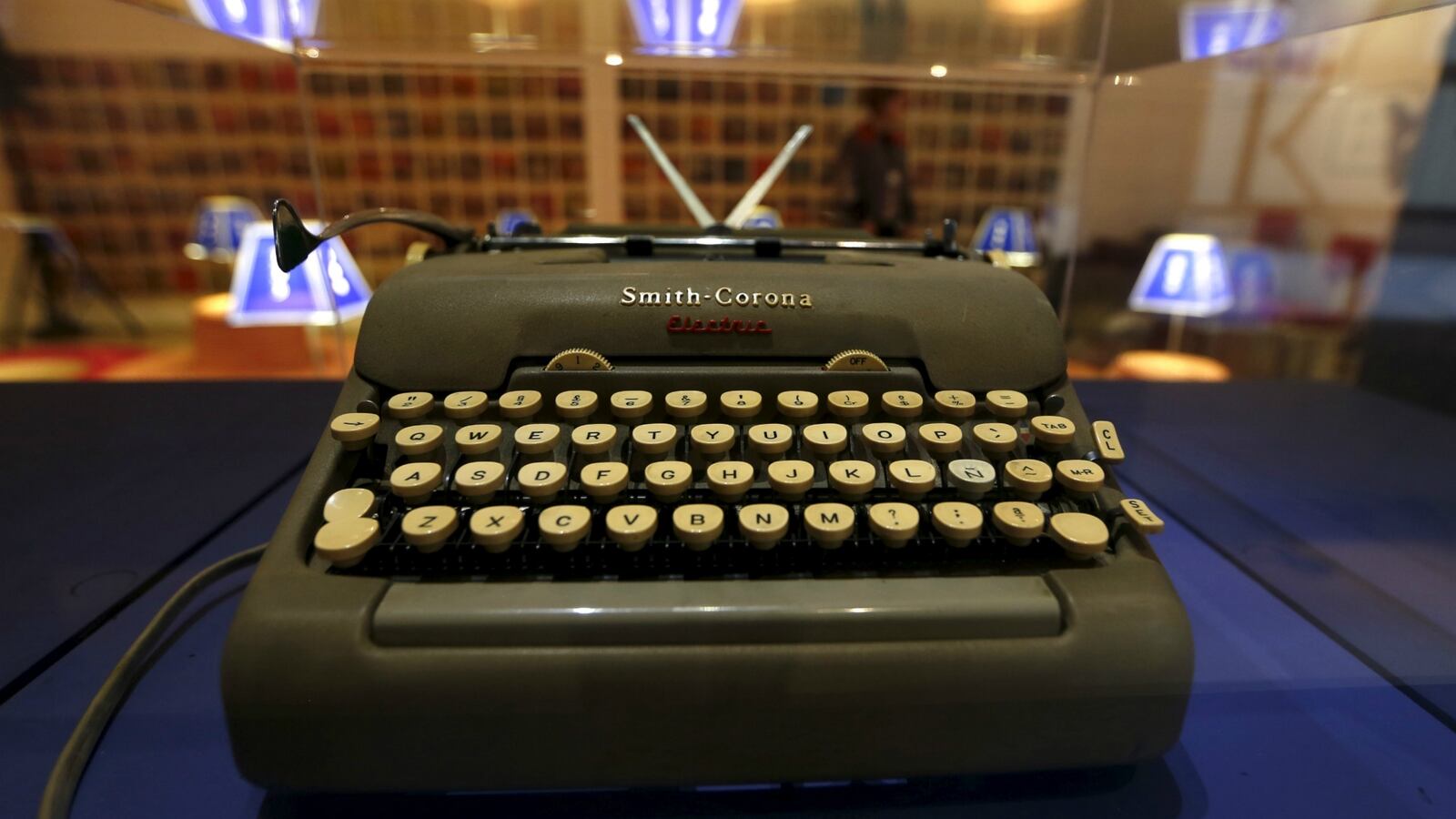Every year, we catalogue the best columns of the past 12 months here at The Daily Beast. It’s a necessarily subjective selection process, though we crowd-source nominations. Our credibility as judges comes from editing (with our friend Jesse Angelo) two Deadline Artists anthologies of America’s greatest newspaper columns.
In the past, we’ve left columnists from The Daily Beast off this list in an attempt cast a wider net. But the shooting at Oregon’s Umpqua Community College inspired some true deadline artistry from The Beast’s Mike Daly and Goldie Taylor.
In the hours after the shooting, Daly seized on the story of U.S. Army vet Chris Mintz, who charged the shooter in an attempt to save others on his son’s 6th birthday. His column created the mantra “Forget the Zero; Remember the Hero.” Goldie Taylor’s take on the mass shooting was more personal: a look back at her father and brother’s death by gun violence, in “Nine Families Are Getting the Same Call I Did.”
Together, those two columns reached more than 5 million readers, showing once more that great columns resonate because they help make sense of sometimes horrific current events. They remind us that we are not alone.
But the biggest game often comes with campaigns, and the surreal spectacle of 2015’s warm-up year provided peak columnist fodder. As candidates for president began haunting the nation’s diners, town halls and debate podiums, the best columnists took out sharp pencils and began wielding them like stilettos, cutting through the fog of hot air spewing from puffed-up politicians.
Frank Bruni aimed high and low, taking on Republican frontrunner Donald Trump and Gov. Scott Walker, whose poor polling numbers led him to quit the race early. In “Trump-ward Christian Soldiers?” Bruni chides professedly pious voters for supporting a bombastic, thrice-married billionaire who “just about runs the table on the seven deadly sins. He personifies greed, embodies pride, radiates lust. Wrath is covered by his anti-immigrant, anti-“losers” rants, and if we interpret gluttony to include big buildings and not just Big Macs, he’s a glutton through and through.”
Walker’s campaign collapsed and he departed stage right, but not without a farewell kick from Bruni in “Scott Walker’s Cocktail of Ignorance.” “His best gaffes were still to come, though he gave us several gems,” writes Bruni. He extended the critique to the public as well as a single flailing politician, “Well beyond the Republican primary and the Republican Party, we’ve exhibited a curious habit in this country of forgiving intellectual blind spots and refashioning a contempt for schooling as an embrace of common sense.”
Over at Commentary, Pete Wehner has been fighting an often lonely fight to connect the soul of the conservative movement with civility in the face of Trump & Co. In a series of columns, sometimes running in the NY Times and the Financial Times, he took on Trumpism early and often, accurately accounting for his rise as the product of certain intellectual and political habits that have “taken hold over the years: a lazy anti-government ideology, prizing emotivism over empiricism, and conflict in pursuit of lost causes.” Wehner thoughtfully skewers the latest emergence of the Know-Nothing populism by calling on the better angels of our nature. To Wehner, conservatism “isn’t dogmatic, inflexible or utopian, believing as it does in the fallen nature of human beings and the importance of human experience.” Wehner is an elegant thinker who brings historic and theological perspective to his columns. His persistent calls for bringing civility, principled compromise and perspective to our politics makes him a much-needed voice for Republicans right now.
Gov. Chris Christie got slammed to the turf in the journalistic equivalent of a quarterback sack by the estimable Tom Moran of the Star-Ledger in a column under the ominous title: “After 14 years of watching Christie, a warning: He Lies.”
“Other lying politicians tend to waffle, to leave themselves some escape hatch. You can almost smell it,” writes Moran, before listing a series of serious whoppers by the man who would be president. “But Christie lies with conviction. His hands don't shake, and his eyes don't wander.”
Ouch.
In the U.K., the Labour Party has been going through the mirror image of the GOP’s travails, with new leader Jeremy Corbyn (think Bernie Sanders on ideological steroids) purging the center-left that brought the party to three consecutive election wins for the first time in its history under Tony Blair. One of the most persuasive push-backs came from a former Marxist, Jonathan Jones, who reflected back on his visit to the Soviet Union, when he said goodbye to all that. “I am a Labour centrist supporter not out of cynicism but out of principle,” Jones wrote in The Guardian, “because I believe the only ethical politics of the left today has to be moderate, reasoning, and skeptical.”
Away from the political scrum, a pair of top California columnists, acting as street anthropologists, discover and expose American tribes engaged in the worst kind of ignorance and excess. In “Kardashian wannabes party hard and do what they want in the Hollywood Hills,” the great Steve Lopez walks through the front door of an opulent mansion where rich hedonists pay $34,000 a month—and along the way, generate enough noise, garish lighting, traffic and jammed-up streets that the ordinary folk are up in arms.
Lopez gets one of the developers behind the controversy to go on the record with this sensitive advice to his neighbors: “Get out of Hollywood. They don’t belong there.... [Blank] those people. I don’t care about them.”
And in “It’s Pathetic that We Don’t Know Sikhs from Muslims,” the Sacramento Bee’s Ben Boychuk gives a scathing, anguished account of the accusations, hassles, and physical violence inflicted on turban-wearing members of the Sikh faith, mistakenly believed to be possible Muslim terrorists by ignorant security guards.
“Good judgment has become a commodity as rare as wisdom,” thunders Boychuk. “The security guards at Qualcomm might say better safe than sorry, and a lot of people would agree. Better smart than stupid, I say.”
The Daily News’ Harry Siegel saved his best for last this year, getting in under the gun with a New Year’s Eve column on his doomed love affair with smoking cigarettes. “It’s time to say goodbye to my oldest, dearest companion, the one that’s been with me for much longer than my wife, let alone my kids. The one that was with me when I felt as new as the sunrise, when I felt as old as the Earth, when I was high as a lord looking down on my city, when I was as low as the sea washing up on it.”
An outlier on this list is Walter Isaacson, who left day-to-day journalism a long time ago. But the celebrated biographer and CEO of the Aspen Institute took a poetic spin in the Sunday Times this year with "Walker Percy's Theory of Hurricanes" to mark the 10th anniversary of Katrina. The NOLA native wove disparate threads together to ruminate on the unity of purpose that can come from tragedy. “’Why is a man apt to feel bad in a good environment, say suburban Short Hills, N.J., on an ordinary Wednesday afternoon?’ Percy wrote in one of his essays. ‘Why is the same man apt to feel good in a very bad environment, say an old hotel on Key Largo during a hurricane?’ Part of the answer is that when a hurricane is about to hit, we no longer feel uncertain about our role in the world. Everyone is focused, connected, engaged…There’s an edgy creativity that comes from the shared aftertaste of danger, a sense of community that comes from knowing you’re in the same boat.”
We’ll close out the Deadline Artist Class of ’15 with another Beast: Ana Marie Cox, who sparked conversation that scrambled partisan assumptions with her testimony of faith in “Why I'm Coming Out as Christian.” “I have not been public about my faith. I am somewhat tempted to embrace the punk-rockness of being a progressive, feminist, tattooed, pro-choice, graduate-educated believer—and then I have to remind myself that believing in God is about as punk rock as wearing pants, maybe even less so.” With disarming honesty and healthy doses of humor, Ana Marie took a risk of intimacy that was rewarded by readers.
Honesty, humor, clarity, and courage are core parts of the columnist’s palette and the surreal spectacle of the still-unfolding campaign seems to ensure that the reported column renaissance will continue in 2016.







